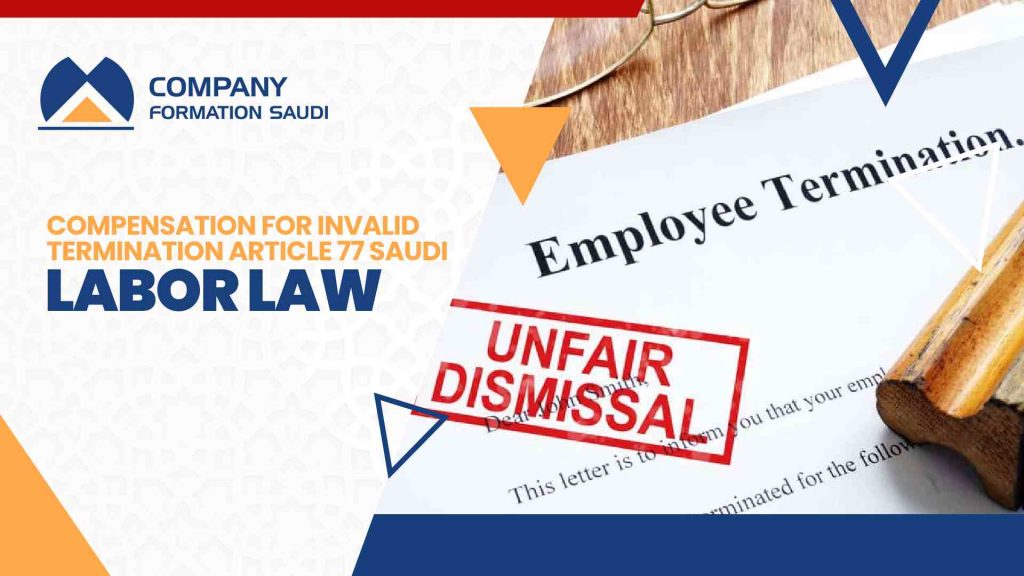Compensation For Invalid Termination: Article 77 Saudi Labor Law
It is crucial to consider local legislation when deciding to go to another nation and seek employment there. Most individuals believe that all laws and regulations are uniform across nations and that everything pertaining to the legal system is global in nature. No, they are not going to be the same, despite how similar they may appear to be. In light of this, if you choose to relocate to Saudi Arabia, we advise reading about the local employment laws. Especially the article 77 Saudi labor law.
In this article, we will be giving you the information you need regarding what is article 77 Saudi labor law and more. Are you a Saudi Arabian employer or employee? If so, it is critical to be aware about the laws and rules controlling the end of a contractual arrangement. Understanding both domestic and international norms for employment contracts is necessary for handling employment contracts.
Types of Employment Contracts in Saudi Arabia

The Labor Law states unambiguously that employment contracts in Saudi Arabia must be in writing. In order to submit applications for visas, all non-GCC local employees require contracts of employment in place. Furthermore, the hiring agreement should have duplicates, with each copy pertaining to each party.
The contract must adhere to the Minister of Human Resources and Social Affairs’ model and include the following information:
- Employer name.
- Proper address.
- Contact information.
- Employee’s nationality, address, and name.
- Employee ID.
- Overview of responsibilities.
- Pay and benefits.
- Work location.
- Expiration date.
- Contract duration.
If relevant, the Saudi Arabia contract of employment must include the following provisions:
- General leave policies.
- Termination of contract guidelines.
- Terms and conditions.
- Rules and other regulations.
In Saudi Arabia, the employment agreement between two parties incorporates all applicable labor regulations. As a result, this law safeguards the rights of workers nationwide. This, even in the events of unlawful termination as the article 77 Saudi labor law states. In this situation, protection also applies to foreign employees of businesses or other organizations.
However, these particular positions are not impacted by this statute in terms of job security:
- Domestic service providers, including landscapers, maids, and chauffeurs.
- Employees of agricultural businesses with less than ten staff members.
- Crew members of vessels carrying less than 500 tons of load.
- Those who have a temporary employment permit.
There are two types of Saudi employment contracts:
Fixed Term
A fixed-term employment contract is a contract that has a specific end date, which means it will automatically terminate once the term expires. However, there are some exceptions and implications that you should be aware of.
A fixed-term employment contract can be beneficial for both the employer and the employee in certain situations. For example:
- Provides flexibility and certainty for both parties, especially if the work is project-based or seasonal.
- Allows the employer to hire skilled workers for a limited period without committing to a long-term relationship.
- Allows the employee to gain experience and exposure in a different field or country without losing their permanent status in their home country.
A fixed-term employment contract can also have some drawbacks for both the employer and the employee. For instance:
- Limit the employee’s chances of career advancement and job security, especially if the contract is not renewed or extended.
- Impose penalties and liabilities on either party if they breach or terminate the contract before the end date, unless there is a valid reason or mutual consent.
- Affect the employee’s entitlements to end-of-service benefits, social insurance, and other rights that depend on the length of service.
A fixed-term employment contract will terminate automatically at its end date, unless it is renewed or extended by mutual agreement. However, either party can terminate the contract before the end date for a valid reason or by mutual consent.
If either party terminates the contract without a valid reason or mutual consent, they may be liable to pay compensation to the other party. The compensation amount will depend on the remaining period of the contract and the actual damages suffered by the other party.
Indefinite Term
According to the Saudi Labor Law, only Saudi nationals and GCC citizens can be employed on indefinite term contracts from the start of employment. Non-Saudi workers must have a short-term contract that specifies the duration and the date of expiration.
An unlimited employment contract offers more flexibility and stability for both employers and employees than a fixed-term contract. For employers, it allows them to retain qualified and experienced staff without having to renew their contracts periodically or pay end-of-service benefits. For employees, it gives them more job security and career opportunities, as well as the right to claim unfair dismissal if they are terminated without a valid reason.
However, an unlimited employment contract also comes with some challenges and risks for both parties. For employers, it may be difficult to terminate an employee who is underperforming or causing problems, as they have to prove that they have a valid reason for dismissal and follow the proper procedures. If they fail to do so, they may face legal action from the employee or the Ministry of Human Resources and Social Development (MHRSD), which can result in fines, penalties, or reinstatement of the employee.
For employees, an unlimited employment contract may not guarantee their rights and benefits if the employer breaches the contract or violates the law. For example, some employers may try to reduce the employee’s wages, change their working hours or conditions, or force them to resign without their consent. In such cases, the employee may have to file a complaint with the MHRSD or the labour courts, which can be time-consuming and costly.
How Much Notice Is Required to Terminate Employment according to Labor Law?

The notice period for terminating a short-term contract is either as in the contract or 60 days if it is not in the contract. On the other hand, the notice period for termination of employment within an indefinite contract is 60 days.
However, there are some exceptions to these rules. For example, if the employer terminates the contract for a valid reason under article 77 Saudi labor law. Such as:
- Poor performance, misconduct or insolvency.
The employer does not have to give any notice. In this case, the employer has to pay the worker a compensation equal to the wages of 15 days for each year of service. This, if the contract is indefinite, or the wages of the remaining term of the contract if the contract is fixed.
Similarly, if the worker terminates the contract for a valid reason under Article 81 of the Saudi Labor Law. Such as:
- Breach of contract, non-payment of wages or abuse by the employer.
There is no requirement for notice from the Saudi business or employer. In this case, the worker is entitled to receive the same compensation as if the employer terminated the contract without a valid reason.
Additionally, if either party terminates the contract during the probationary period, which cannot exceed 180 days, they only have to give one-day notice. The probationary period must clearly appear in the contract and both parties must agree to it.
Therefore, depending on your situation, you may have to give different notice periods to terminate your employment contract in Saudi Arabia.
What Is Severance Pay in Article 77 Saudi Labor Law
Severance pay is the compensation that an employer or an employee has to pay to the other party if the employment contract is terminated for an invalid reason. This, according to Saudi labor law article 77. The amount of severance pay depends on whether the contract is for a fixed term or an indefinite period, and on the length of service of the employee.
If the contract is for an indefinite period, the severance pay is equal to 15 days’ salary for each year of service. If the contract is for a short term, the severance pay is equal to the full salary for the remaining period of the contract. However, according to the article 77 Saudi labor law. the severance pay cannot be less than 2 months’ salary in either case.
The invalid reason for termination is any reason that does not appear in Article 74 of the Saudi Labor Law. This specifies the cases where an employer or an employee can terminate the contract without any liability. Some of these cases include mutual consent, expiration of the contract term, disability, retirement, death, and gross misconduct.
Severance pay is a legal right that aims to protect the interests of both parties. Plus, to compensate them for any damages caused by the termination of the contract. It also encourages employers and employees to respect their contractual obligations. And to avoid arbitrary or unfair dismissal.
What are the Penalties in Saudi Labor Law
A number of strict policies have been put in place by the Kingdom of Saudi Arabia (KSA) to control foreign workers’ employment there.
Expatriates will now be subject to a severe fine of Saudi Riyal 5,000 if they are discovered working without the necessary permission work permit or neglecting to notify the authorities.
The Saudi Gazette recently reported that the following infractions are subject to the new sanctions introduced by the labor law:
- Hiring expats without work permits. A punishment of Saudi Riyal 5,000 will be in place for businesses who hire expats without the necessary labor authorization or fail to notify the Ajeer Program.
- Disregarding safety and health. Companies that disregard government health and safety laws or do not take the necessary precautions to protect employees risk paying fines between 1,500 and 5,000 Saudi Riyals.
- Obligations for child care. Employers with more than 50 employees now have a duty to provide daycare or childcare services. Refusal to follow the rules will result in a Saudi Riyal 5,000 fine.
- Employment of minors. If someone under 15 years old is working, companies will be subject to a fine of 1,000 to 2,000 Saudi Riyals.
- Women’s postpartum employment. A fine of 1,000 Saudi Riyals will be in place if a woman gets a job during the initial six weeks following childbirth.
- Retention of employee documents. Employers who refuse to release an employee’s residence permit or passport risk a 1,000 Saudi Riyal fine.
- Salary non-payment. A Saudi Riyal 300 fee will be in place if salaries are in the recipient’s account during the proper dates.
Conclusion
Saudi labor law establishes the norms and regulations that specify the labor obligations between an employer and an employee. It outlines both the rights and responsibilities of the employer and employee. Thus, everyone must be conscious of all of these variables in order to reduce legal inconveniences.

To learn more about other topics regarding Saudi labor law article 77, termination of employment, or more, go to our insights section!



